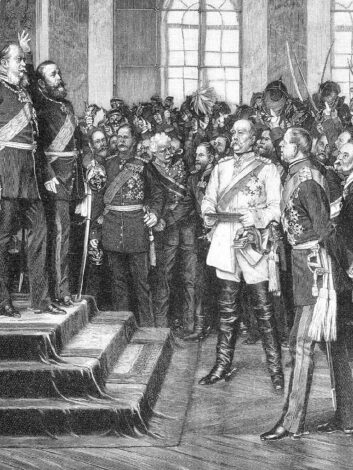The story of Weimar Germany must begin with its predecessor, Imperial Germany. The German nation was comparatively young, formed in 1871 by the unification of more than two-dozen German-speaking kingdoms and duchies. The men who instigated and led this process were nationalist politicians and generals, some of whom had been urging German unification for many years. Advocates of unification were convinced that a German superstate – with its sizeable territory, natural resources, industrial might and military power – could come to dominate Europe. The most powerful of the German-speaking states was Prussia, the Hohenzollern kingdom fixated with war and militarism. The Prussians were renowned for their military prowess: their army contained an elite officer corps leading ranks of highly trained soldiers. Prussia had Europe’s most skilled army of the 1800s, a fact born out by stunning victories over Austria (1866) and France (1871). These victories paved the way for German unification, as the smaller German-speaking kingdoms began to see the political and economic advantages of falling in behind the powerful Prussian monarchy. The creation of the German Empire was finalised in Versailles, near Paris, in 1871.
From 1871 to 1890, imperial Germany was guided by the firm but watchful hand of Count Otto von Bismarck. No single figure contributed more to shaping imperial and modern Germany – and indeed to pre-war Europe. Though Bismarck was a nationalist at heart, he was also a realist who wanted to protect the new German state by preventing another major European war. His greatest fear was a two-front war with both France and Russia, Germany’s strongest military rivals in mainland Europe. Bismarck adopted foreign policy methods later known as Realpolitik. Its most visible feature was the ‘Iron Count’s’ web of treaties, which furthered German interests without risking war. Bismarck focus on maintaining the balance of power in Europe meant he had little interest in expanding or developing Germany’s foreign colonies, which remained small and under-utilised in comparison to those of Britain and France.
At home, Bismarck’s domestic leadership was a study in ‘benevolent authoritarianism’. Both Germany and its parent state, Prussia, had the trappings of a democratic state: constitutions, elected legislatures and multiple political parties. But limited voting rights and restrictive electoral systems ensured that conservative elites maintained their grip on power. Prussian Junkers (land-owning aristocrats) dominated the imperial government and the upper ranks of the military. Bismarck and his ministers also adopted policies to unify Germany beyond the political arena. German was sanctioned as the empire’s official language; its use became compulsory in civil administration, business and schools. Bismarck’s notorious Kulturkampf of the 1870s attempted to curtail the social influence of the Catholic Church. The government imposed a national system of law that overrode or replaced legal systems from pre-unification.
“At the highest level of government, the existence of a German nation-state seemed to guarantee continuity. The nation was legitimate and sacred, so that the citizen would give his life for it, declared Hans Delbruck in 1913. The political institutions of the empire had quickly acquired a national aura which, by the 1890s at the latest, seemed self-evident to all parties. The political institutions of the Reich gained legitimacy on their own account, as organs of a ‘constitutional’ system of government. [But] it is true that obstacles to democratisation remained.”
Mark Hewitson, historian
Economically, imperial Germany progressed and developed at a great pace under Bismarck’s government. Using British industrial growth as a model, German companies invested heavily in factory-building, engineering, motors, chemical research and electrification. The government assisted trade and growth by commissioning large-scale railway and infrastructure projects. German capitalism boomed, generating increases in urban growth, employment and standards of living. During the 1880s, Bismarck introduced unemployment relief, old age pensions and protections for sick or injured workers. These reforms, the first implementation of a modern welfare system, were popular with German workers. They slowed emigration to the US and Britain and won the loyalty of ordinary Germans. The Bismarckian state which, while authoritarian and largely undemocratic, appeared genuinely interested in protecting its people.
All this would change with the ascension of a new emperor. When 29-year-old Wilhelm II became Kaiser in 1888, it marked the beginning of the end for Bismarck, European Realpolitik and paternalist domestic policies. The brash young Kaiser was uninterested in maintaining European stability – his ambition was to expand the German Empire abroad, by increasing German naval power and adopting a more forceful international approach. By 1890, Bismarck had been forced into retirement. The old chancellor’s cautious but pragmatic Realpolitik was replaced by the Kaiser’s Weltpolitik (‘world politics’) which was aimed at securing Germany’s “place in the sun”. The German Empire embarked on two decades of political and military transformation, leading to the largest war in human history.

1. The German state was formed in 1871 by the unification of numerous German-speaking European kingdoms.
2. Imperial Germany was dominated by Prussian militarism and the nationalist but pragmatic Bismarck.
3. The imperial government was a limited democracy, with most power residing with conservative elites.
4. In 1871-90 Germany underwent rapid industrial and economic growth, coupled with progressive social reforms.
5. The era of Bismarck ended with the rise of Kaiser Wilhelm II, who pressured the old chancellor into retirement and set about expanding Germany’s naval and imperial power.
© Alpha History 2014. Content on this page may not be republished or distributed without permission. For more information please refer to our Terms of Use.
This page was written by Jennifer Llewellyn, Jim Southey and Steve Thompson. To reference this page, use the following citation:
J. Llewellyn et al, “Imperial Germany”, Alpha History, 2014, accessed [today’s date], http://alphahistory.com/weimarrepublic/imperial-germany/.

